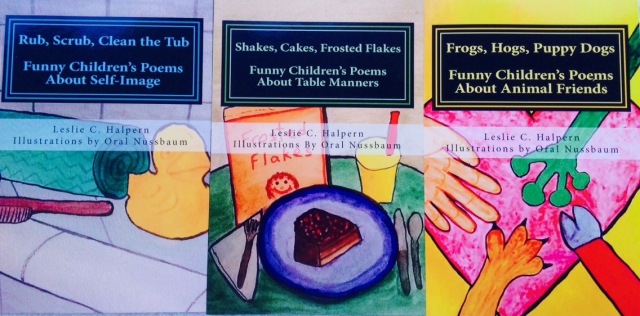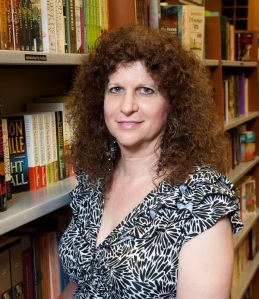by Leslie C. Halpern
When I tell people I write children’s poetry books, perform with a poetry ensemble, and once worked with a Shakespearean acting troupe, they often roll their eyes and tell me they don’t like poetry. That’s usually because as children they never learned to understand the language of poems.
Parents can make poetry fun and educational by introducing age-appropriate poems to young children. Infants will respond to hearing rhymed poems and looking at illustrations. As soon as a child can speak, he or she can explain what the pictures mean and guess what happens next. By being active listeners, children learn to decode language at an early age and may develop a life-long love of words.
Blending Concrete and Abstract
When children become accustomed to the language, they can appreciate one of poetry’s most beautiful elements: blending concrete (what’s experienced through our senses) and abstract (emotional truth without physical proof).
The poem “Chew Chew Train” from my book, Shakes, Cakes, Frosted Flakes: Funny Children’s Poems About Table Manners combines concrete images (strained spinach, ice cream) with abstract ideas (playing tricks, comparing a mouth to a tunnel). This humorous look at parent-child interactions at the dinner table offers a child’s point of view about adult manipulation.
Illustration by Oral Nussbaum, from the book Shakes, Cakes, Frosted Flakes.
Chew Chew Train
“Open wide for the choo choo train,”
my parents sometimes say.
There is no train, just spinach strained,
but I open anyway.
A spoon with spinach doesn’t look
like any kind of choo choo.
It’s the oldest trick in the book,
like kissing someone’s boo boo.
The train still comes and blow its steam,
but now the tunnel shuts.
I wait for spoons of soft ice cream,
caramel, and nuts.
Poetry For Young Children
Most children enjoy figuring out symbols and metaphors, and finding patterns in the poetry. They also find comfort and gain confidence from anticipating rhyme and repeating rhythm of traditional children’s poems. Rhyme and rhythm make memorization easier.
Repetition is a key element in the poem “Snakes on a Bus,” from my book, Frogs, Hogs, Puppy Dogs: Funny Children’s Poems About Animal Friends. Repeating final words in the rhymed couplets helps children remember and recite this short lesson in safety.
Illustration by Oral Nussbaum, from the book Frogs, Hogs, Puppy Dogs.
Snakes on a Bus
Kevin brought three snakes on the bus, bus, bus.
And waved them around at us, us, us.
The snakes stared, but didn’t hiss, hiss, hiss.
Kevin screamed: “Take this, this, this!”
The driver slammed his brakes, brakes, brakes.
But Kevin’s snakes were fakes, fakes, fakes.
Although the drive to school is far, far, far,
Kevin now must come by car, car, car.
Writing Their Own Poetry
Reading and reciting poetry often leads children to write their own pieces. Encourage each child to write in easier forms, such as haiku (17 syllables total with three lines broken into 5, 7, 5 syllables each line), rhymed couplets (two lines with rhyming final words), and free verse (no designated rhyme or rhythm).
To enhance their poetry, children can draw pictures or use artwork and photographs from magazines to illustrate poems. Compile their best written poems or their favorite poems by other poets into a hand-written book, a booklet printed from the computer, or a blank book purchased from the store. Let the child “perform” this poetry in front of family and friends, using silly props and percussion instruments, such as tambourines, bells, and drums, to increase the fun. The important part of this process – and what will be appreciated most – is for parents and children to explore poetry together.
Leslie C. Halpern, Author Bio: Award-winning poet Leslie C. Halpern has a Master’s Degree in Liberal Arts and Bachelor’s Degree in Journalism. In addition to children’s books, she writes nonfiction books about the entertainment industry for adults, and reviews books and movies for several online publications. Find out more about her at www.LeslieHalpern.com and www.facebook.com/LeslieCHalpern.
BOOK SYNOPSES: Award-winning poet Leslie C. Halpern wrote her Funny Children’s Poems book series to educate and entertain early readers, ages 5-9. The series includes Frogs, Hogs, Puppy Dogs: Funny Children’s Poems About Animal Friends (2014), Shakes, Cakes, Frosted Flakes: Funny Children’s Poems About Table Manners (2013), and Rub, Scrub, Clean the Tub: Funny Children’s Poems About Self-Image (2012), all published by Cricket Cottage Publishing and illustrated with whimsical watercolor paintings by Oral Nussbaum. Told from a child’s perspective, Frogs, Hogs, Puppy Dogs takes a light-hearted look at our relationships with house pets and zoo animals; Shakes, Cakes, Frosted Flakes humorously studies eating habits, nutrition, and etiquette; and Rub, Scrub, Clean the Tub provides a child’s distorted view of personal hygiene, interpersonal relationships, and self-image. All three books in the Funny Children’s Poems series include parent-teacher resource pages with challenging questions, fun games, and glossaries of unfamiliar words. Find Leslie’s children’s books and adult nonfiction books about the entertainment industry at www.Amazon.com , on her website at www.LeslieHalpern.com, and on Facebook at www.facebook.com/funnychildrenspoems.




I love doing poetry with my kids. They always come up with the most surprising interpretations.
Adults and children alike giggle at the poems or the pictures. What fun it has been to be a part of this series!
Thanks so much for posting my article. Let’s get kids reading and writing poetry!